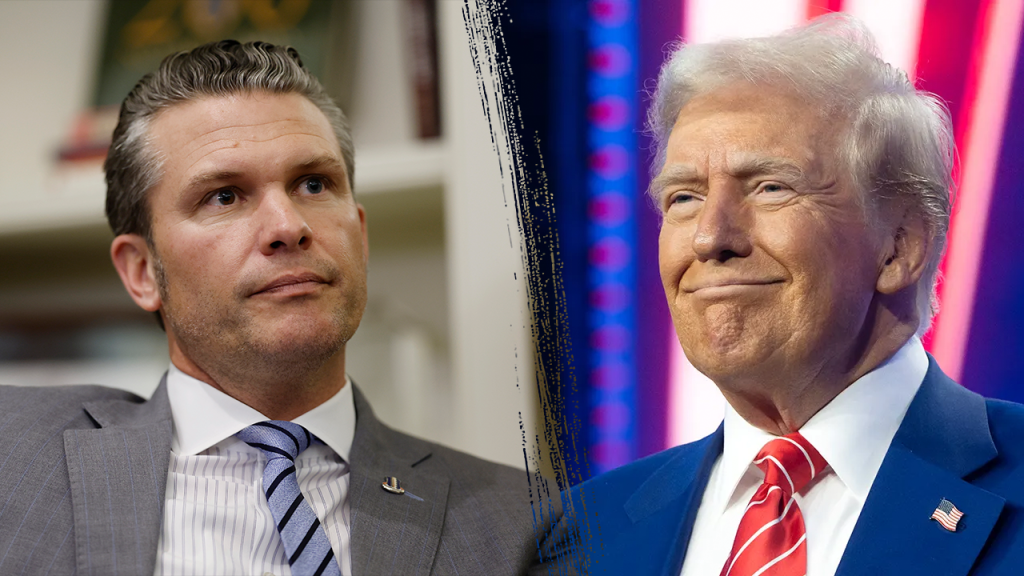Former President Donald Trump recently discussed his controversial decisions to pardon several military service members accused of war crimes during his administration. In an interview, Trump highlighted how now-Secretary of Defense Pete Hegseth played a significant role in advocating for these pardons, emphasizing his belief that these individuals were unfairly prosecuted for actions they took during combat. This discourse brings to light ongoing debates about military conduct, legal accountability, and the ramifications of Trump’s policies on justice for military personnel.
| Article Subheadings |
|---|
| 1) Overview of Trump’s Pardons for Military Personnel |
| 2) Role of Pete Hegseth in Securing Pardons |
| 3) Controversies Surrounding the Pardoned Service Members |
| 4) Confirmation Hearing Insights from Hegseth |
| 5) Responses from Lawmakers and Military Officials |
Overview of Trump’s Pardons for Military Personnel
During his presidency, Donald Trump made headlines for granting clemency to several service members who faced accusations of war crimes. This included pardons for Army 1st Lt. Clint Lorance, Army Maj. Mathew Golsteyn, and Navy Special Warfare Operator Chief Eddie Gallagher. These controversial decisions created significant public discourse regarding military justice and the actions of service members in combat situations. Lorance, for instance, had been serving a lengthy prison sentence for ordering his troops to shoot at unarmed Afghan civilians, while Golsteyn was accused of murdering a Taliban bomb maker and burning the body. Gallagher was involved in a case where he was accused of stabbing an Islamic State fighter. Trump’s intervention brought light to the broader issue of how military personnel are treated under U.S. law.
Role of Pete Hegseth in Securing Pardons
Within the context of these pardons, Pete Hegseth, who has gained notoriety as a media personality and military officer, became an important figure. Trump indicated that Hegseth frequently reached out to him regarding the plight of these service members, advocating for their release on the basis that they were merely doing their jobs as trained soldiers. Hegseth’s commitment to this cause aligns with his experiences and ideologies about military engagement and accountability. As a former Army National Guard member and host at Fox News, Hegseth has actively voiced his stance that service members facing harsh penalties for battlefield decisions should be viewed as warriors rather than war criminals.
Controversies Surrounding the Pardoned Service Members
The actions of Lorance, Golsteyn, and Gallagher have sparked widespread debate and criticism, especially regarding the ethical implications of their behavior during service. Lorance ordered military action that resulted in civilian deaths; while Golsteyn allegedly executed a suspected insurgent without due process. Gallagher, though acquitted of murder, was convicted for posing with a corpse—a stark violation of military conduct standards. Critics and fellow military personnel argue these actions do not represent honorable service but rather a deviation from the moral and ethical obligations required of soldiers. Trump’s pardons reignited discussions about how such cases are handled legally and the balancing act between military conduct and accountability.
Confirmation Hearing Insights from Hegseth
Upon taking office as Secretary of Defense, Hegseth was put before the Senate Armed Services Committee for a confirmation hearing during which he articulated his philosophies on military engagement and legal frameworks governing military operations. He stated that overly burdensome rules of engagement hinder the effectiveness of service members and should be reassessed, a sentiment resonant with those who support a more aggressive military approach. Hegseth’s views suggest a shift towards a stance where combat effectiveness is prioritized, and legal repercussions are seen as impediments. His remarks have resonated with segments of the military and political landscape that favor a more assertive military policy.
Responses from Lawmakers and Military Officials
The pardons and Hegseth’s statements did not go unanswered from opposition lawmakers and military leaders. Senator Jack Reed, a ranking member of the Senate Armed Services Committee, emphasized that military professionals are bound by ethical obligations to report misconduct, and those who fail to uphold these standards should not be excused. This pushback highlights the ongoing conflict between advocating for military personnel and maintaining a system of justice that holds individuals accountable for their actions. These discussions reflect a broader debate about the nature of military service, accountability, and the ramifications of political decisions made in the name of service member support.
| No. | Key Points |
|---|---|
| 1 | Trump granted pardons to service members accused of war crimes. |
| 2 | Pete Hegseth played a crucial advocacy role for these pardons. |
| 3 | The pardoned individuals faced serious allegations that raised ethical concerns. |
| 4 | Hegseth’s confirmation hearing highlighted his views on military engagement. |
| 5 | Lawmakers voiced concerns regarding military ethics and accountability. |
Summary
The discussions surrounding President Trump’s pardons during his administration continue to impact perceptions of military justice and ethical standards within the armed forces. The involvement of Pete Hegseth as an influential advocate for these service members underscores the ongoing complexities in reconciling military conduct with legal accountability. As the debate unfolds, the implications of these actions remain significant, shaping discussions about the future of military policies and the treatment of service members accused of misconduct.
Frequently Asked Questions
Question: What prompted Trump to issue pardons for these military service members?
Trump believed these individuals were unfairly prosecuted for actions taken during combat and that they were merely following orders in a complex environment.
Question: How did Pete Hegseth influence the pardons?
Hegseth frequently communicated with Trump, advocating for the release of servicemen who he felt had been treated harshly due to their actions in combat, arguing that they were warriors rather than criminals.
Question: What has been the reaction from lawmakers regarding these pardons?
Lawmakers, especially those opposing the pardons, expressed concerns that these decisions undermine military ethics and accountability, emphasizing the importance of upholding legal standards within the military.


